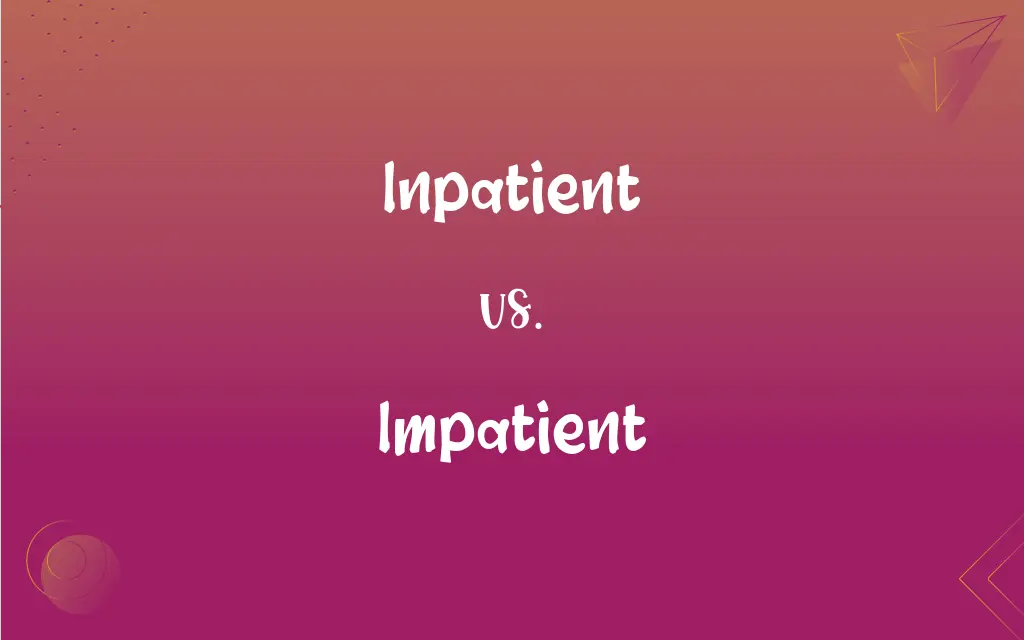Inpatient vs. Impatient: What's the Difference?
Edited by Aimie Carlson || By Janet White || Updated on November 10, 2023
"Inpatient" refers to a patient who stays in a hospital for treatment, whereas "impatient" describes a person who is restless or unable to wait.

Key Differences
Inpatient is a term used in the medical field to describe a patient who is admitted to a hospital and stays there for at least one night for treatment. Impatient, on the other hand, is an adjective describing someone who is not willing to wait or who easily gets irritated by delays.
The term inpatient is often used in the context of healthcare and indicates a level of care that requires hospitalization. In contrast, impatient is used to describe a person's behavior or temperament, often suggesting a lack of patience or a desire for immediate action or results.
Inpatients receive extensive medical care, including constant monitoring, surgery, or other treatments that cannot be done on an outpatient basis. Impatient individuals may exhibit signs of annoyance, such as foot tapping, sighing, or expressing frustration verbally.
Inpatient care is typically more intensive and costly due to the resources required for prolonged hospital stays. Impatient behavior, however, is more about emotional response and has no direct financial implications, but it can affect interpersonal relationships and decision-making.
Inpatient status changes the way healthcare is delivered, focusing on more comprehensive and round-the-clock care. Impatient as a character trait, although unrelated to healthcare, can impact a person’s interactions in various situations, including in medical environments.
ADVERTISEMENT
Comparison Chart
Definition
A patient staying in a hospital
A person who is restless or eager
Context
Medical, healthcare
Behavioral, emotional
Nature of Term
Noun (Describes a type of patient)
Adjective (Describes behavior)
Implications
Medical care and treatment
Emotional response and behavior
Usage
Hospital and healthcare settings
General, in various contexts
ADVERTISEMENT
Inpatient and Impatient Definitions
Inpatient
Admitted to a hospital.
She became an inpatient for her treatment.
Impatient
Desiring quick results.
He was impatient for the results.
Inpatient
Undergoing extensive medical care.
The inpatient needed constant monitoring.
Impatient
Restless or eager.
He became impatient with the slow service.
Inpatient
A hospital patient.
He was an inpatient for three days after surgery.
Impatient
Showing signs of annoyance.
The impatient customer tapped her foot loudly.
Inpatient
Receiving hospital treatment.
The inpatient received 24-hour care.
Impatient
Unable to wait calmly.
She was impatient for the meeting to start.
Inpatient
Staying overnight in a hospital.
As an inpatient, he had a room in the hospital.
Impatient
Irritated by delays.
She was impatient with the traffic jam.
Inpatient
A patient who is admitted to a hospital or clinic for treatment that requires at least one overnight stay.
Impatient
Unable to wait patiently or tolerate delay; restless.
Inpatient
Of or relating to inpatients or their care.
Impatient
Unable to endure irritation or opposition; intolerant
Impatient of criticism.
Inpatient
(healthcare) A patient whose treatment needs at least one night's residence in a hospital; a hospitalized patient.
Impatient
Expressing or produced by impatience
An impatient scowl.
Inpatient
A patient who receives lodging and food, as well as treatment, in a hospital or an infirmary; - distinguished from outpatient.
Impatient
Restively eager or desirous; anxious
Impatient to begin.
Inpatient
A patient who is residing in the hospital where he is being treated
Impatient
Restless and intolerant of delays.
Impatient
Anxious and eager, especially to begin something.
Impatient
(obsolete) Not to be borne; unendurable.
Impatient
Prompted by, or exhibiting, impatience.
Impatient speeches or replies
Impatient
Not patient; not bearing with composure; intolerant; uneasy; fretful; restless, because of pain, delay, or opposition; eager for change, or for something expected; hasty; passionate; - often followed by at, for, of, and under.
A violent, sudden, and impatient necessity.
Fame, impatient of extremes, decaysNot more by envy than excess of praise.
The impatient man will not give himself time to be informed of the matter that lies before him.
Dryden was poor and impatient of poverty.
Impatient
Not to be borne; unendurable.
Impatient
Prompted by, or exhibiting, impatience; as, impatient speeches or replies.
Impatient
One who is impatient.
Impatient
Restless or short of temper under delay or opposition;
Impatient with the slower students
Impatient of criticism
Impatient
(usually followed by `to') full of eagerness;
Impatient to begin
Raring to go
FAQs
Is inpatient care only for severe conditions?
Often, but not exclusively; it depends on the treatment needed.
Can impatience be a positive trait?
Rarely, as it often leads to frustration and rash decisions.
Are inpatient facilities only in hospitals?
Primarily, though some specialized clinics also offer inpatient care.
Are all hospital patients inpatients?
No, some are outpatients, receiving care without an overnight stay.
Is being impatient always negative?
Often, though it can sometimes motivate quick action.
What differentiates inpatient from outpatient care?
Inpatient care involves staying overnight in the hospital, unlike outpatient care.
Is impatience linked to personality types?
It can be influenced by personality, environment, and habits.
Can impatience affect mental health?
Yes, chronic impatience can lead to stress and anxiety.
Can children be impatient?
Yes, children can exhibit impatience, often due to a lack of understanding of time.
Does inpatient care include emergency services?
Yes, it can include a range of services, including emergency care.
What's the average duration for inpatient stays?
It varies greatly depending on the condition and treatment.
How can one manage impatience?
Through techniques like mindfulness, deep breathing, and perspective-taking.
Is impatience a learned behavior?
It can be, influenced by environment and experiences.
Can impatience be a sign of deeper issues?
In some cases, it can indicate underlying stress or anxiety disorders.
Can meditation help with impatience?
Yes, it can be effective in managing impatience.
Can family visit inpatients anytime?
Visiting hours and policies vary by hospital.
Can impatience affect relationships?
Yes, it can lead to conflicts and misunderstandings.
Is insurance coverage different for inpatient care?
Yes, inpatient care often has different insurance policies and coverage.
Do inpatients have private rooms?
It depends on the hospital; some offer private rooms, others have shared spaces.
Do inpatients get special dietary care?
Yes, hospitals often provide dietary care tailored to inpatients' needs.
About Author
Written by
Janet WhiteJanet White has been an esteemed writer and blogger for Difference Wiki. Holding a Master's degree in Science and Medical Journalism from the prestigious Boston University, she has consistently demonstrated her expertise and passion for her field. When she's not immersed in her work, Janet relishes her time exercising, delving into a good book, and cherishing moments with friends and family.
Edited by
Aimie CarlsonAimie Carlson, holding a master's degree in English literature, is a fervent English language enthusiast. She lends her writing talents to Difference Wiki, a prominent website that specializes in comparisons, offering readers insightful analyses that both captivate and inform.































































